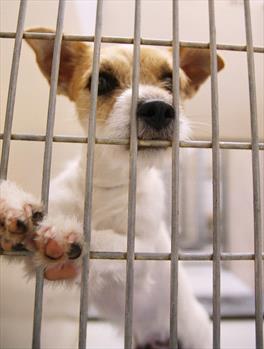Dog behind bars in animal shelter

Photo courtesy of Depositphotos
No one is coming through COVID-19 untouched. Animal shelters are no different. Many shelters have been greatly supported by their communities during the pandemic. When the orders came down from on high that only essential workers could be out and about, animal shelters all over the nation put out a call for foster families. They knew that without their armies of volunteers, their capacity to care for the animals would diminish. The response was overwhelmingly positive. Some shelters were able to effectively empty themselves of animals. Even better, a number of foster families have become “foster failures,” meaning that they have decided to formally adopt the pet they were fostering.
As we move forward during the pandemic, we can continue to help our companion animals and the shelters they came from.
Many people may be fostering a pet for the first time. It’s possible they never felt like they had the time before, but they do now. If that’s you, then by all means, foster! But before you decide to adopt permanently, consider what your life may be like in several months or next year. Will you still have the time for a pet? If you will be going back to a long commute and/or long hours some place other than home, how will you care for your pet then? And how about your job? The sad fact is that not everyone will be able to afford a new pet.
Because of the shortage of personal protective equipment (PPE) and other factors, many veterinary clinics and animal shelters have severely curtailed the number of spays and neuters they are doing. Since this is “kitten season,” this is worrisome. Shelters will likely be inundated with kittens and puppies in a few months since they have not been able to do surgery to prevent litters from being born. If your pet is intact, please keep it indoors. If it must go outside, then make sure it’s on a leash. This will help prevent unwanted pregnancies that will add to the pet overpopulation problem.
Whether you are fostering, adopting, or already own all the pets you intend to have right now, it’s important to have a plan in place should you become sick, or even worse, die. Discuss with family and friends what they can do to help your pets if you become incapacitated. If you have a will, make sure your pets are listed in it. Indicate who will take care of them and whether or not there are any financial plans for that care.
Unfortunately, shelters are also bracing for the worst impact of COVID-19: an increase in intake due to families hit hard financially and those without anyone else to care for their pets while they are in the hospital or should they pass. As was seen with the Great Recession, when people are experiencing a severe and sustained loss of income, pets are surrendered to shelters. Simultaneously, local governments are often hit with a loss in taxes, which means municipal shelters often have less in their budgets. Nonprofits are also hurt as donors decrease in number and ability to give. If you are fortunate enough to be in a position to donate funds or goods to your local animal shelter, they will be grateful.
After all, we’re all in this together, two-legged and four.